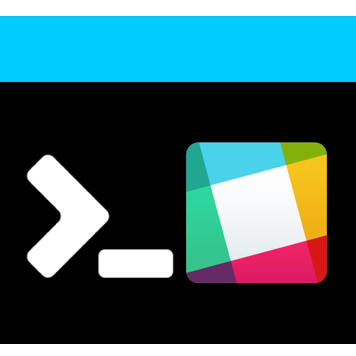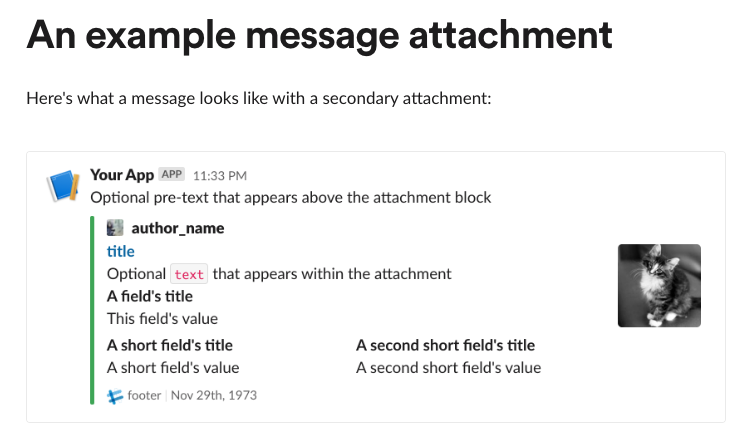A simple utility to send a Slack message using Slack Web API to your channels
> sudo snap install slack-send(https://snapcraft.io/slack-send)
# use it in your project directly
> dotnet add package slack-sendslack-send --help
-h, --help (default: false) Prints this help message.
-c, --channels (default: 'general') Slack channels to send message, separated by ';', default is empty, which means use the channels in the configuration file.
-d, --desc (default: 'my description') description on the top of the message
-t, --title (default: 'my title') title to send
-m, --message (default: 'message to send') message body to send
-s, --status (default: 'good') Status good | warning | error, default is good
-j, --json (default: empty) JSON formated Slack message (https://api.slack.com/reference/messaging/attachments), it overrides the message and status options, if those values exist on JSON.
--help Display this help screen.
--version Display version information.# slack-send -m <message> -c <channel>
> slack-send -m "Hello, My Slack Channel!" -c "general"# slack-send -m <message> -c <channel1>;<channel2> ...
> slack-send -m "Hello, My Slack Channel!" -c "general;random"# slack-send -d <description> -t <title> -m <message> -c <channel1>;<channel2> ...
> slack-send -d "This is a description" -t "This is a title" -m "Hello, My Slack Channel!" -c "general;random"# slack-send -d <description> -t <title> -m <message> -c <channel1>;<channel2> ... -j <json_string>
> slack-send -d "This is a description" -t "This is a title" \
-m "Hello, My Slack Channel!" \
-c "general;random" \
-j "{\"color\":\"#36a64f\",\"pretext\":\"Optional pre-text that appears above the attachment block\",\"author_name\":\"author_name\",\"author_link\":\"https://flickr.com/bobby/\",\"author_icon\":\"https://placeimg.com/16/16/people\",\"title\":\"title\",\"title_link\":\"https://api.slack.com/\",\"text\":\"Optional `text` that appears within the attachment\",\"fields\":[{\"title\":\"A field's title\",\"value\":\"This field's value\",\"short\":false},{\"title\":\"A short field's title\",\"value\":\"A short field's value\",\"short\":true},{\"title\":\"A second short field's title\",\"value\":\"A second short field's value\",\"short\":true}],\"thumb_url\":\"https://placekitten.com/g/200/200\",\"footer\":\"footer\",\"footer_icon\":\"https://platform.slack-edge.com/img/default_application_icon.png\",\"ts\":123456789}"- You need to acquire your Slack API token from Slack in order for slack-send to send messages to your Slack channels, typically starts with 'xoxb-'.
- The configuration file
~/.slack-sendwill be created when the app run first time to store your configuration.
You can also update the ~/.slack-send to set the default values for the message, channel, and attachments.
ApiToken: Your Slack API Key for a bot, typically starts with 'xoxb-'.ApiUrl: The Slack API URL for sending messages.Channels: An array of channel names to send the message to.Attachments: An array of attachments to send with the message. The format of the attachments is the same as the JSON format for attachments in the Slack API.
{
"ApiToken": "<your Slack API Key for a bot, typically starts with 'xoxb-'>",
"ApiUrl": "https://slack.com/api/chat.postMessage",
"Channels": [ "<your channel #1>", "<your channel #2>" ],
"Attachments": [
{
"author_name": "<your sender name, i.e. GitHub Actions>",
"author_icon": "https://github.com/fluidicon.png"
}
]
}If you prefer to have fine control of your Slack message, you can use the Slack's own JSON format (Attachments) directly, which will override the message and status options in '~/.slack-send'.
{
"channel": "ABCDEBF1",
"attachments":
[
{
"mrkdwn_in": ["text"],
"color": "#36a64f",
"pretext": "Optional pre-text that appears above the attachment block",
"author_name": "author_name",
"author_link": "https://flickr.com/bobby/",
"author_icon": "https://placeimg.com/16/16/people",
"title": "title",
"title_link": "https://api.slack.com/",
"text": "Optional `text` that appears within the attachment",
"fields":
[
{
"title": "A field's title",
"value": "This field's value",
"short": false
},
{
"title": "A short field's title",
"value": "A short field's value",
"short": true
},
{
"title": "A second short field's title",
"value": "A second short field's value",
"short": true
}
],
"thumb_url": "https://placekitten.com/g/200/200",
"footer": "footer",
"footer_icon": "https://platform.slack-edge.com/img/default_application_icon.png",
"ts": 123456789
}
]
}

